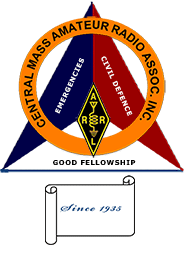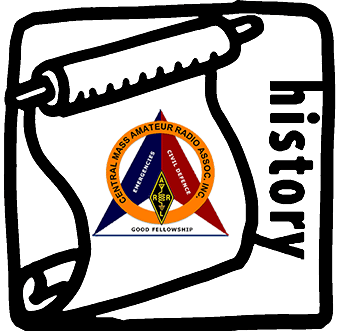CMARA Repeater Operating Procedures
CMARA, the Central Massachusetts Amateur Radio Association, Inc., is a not-for-profit corporation, formed to encourage and foster mutual interest in amateur radio communications and provide public service. CMARA provides such communication when required as a result of normal communication means being disrupted by natural or man made causes. CMARA operates a radio repeater station (146.97 Mhz) to enhance the quality of communication available.
The CMARA repeater (W1BIM) is licensed by the Federal Communications Commission and the users of said repeaters MUST comply with ALL FCC mandated rules and regulations.
IN ADDITION, beyond the minimum required by law, CMARA has established operating procedures to optimize the use of the repeaters and to define a level of quality representative of the club.
While not all-inclusive, the following procedures establish a baseline for all repeater users to follow.
-
Station Identification:
- All stations should identify themselves using their FCC assigned callsign upon initially transmitting on the repeater and every ten minutes thereafter. In addition, when operating in a net or “roundtable” your callsign should be announced more frequently if needed to facilitate efficient communication.
- Any transmission on the repeater which is not either indicating you are listening, or calling another station or stations before communication is established is considered “Broadcasting” and is not allowed on Amateur Radio and on the repeater.
- When initially coming on the repeater, when not previously in use (verified by LISTENING for a reasonable time or if you’re not sure ask “is the repeater is in use” PRIOR to transmitting), it is only necessary to announce your call.
- To test repeater access, don’t kerchunk the repeater without ID. Instead, use the term “testing”. Example: “your callsign testing”.
- If you want a signal report from another amateur, state that in plain English. Example: “This is your callsign, can someone give me a signal report?”
- If you hear someone testing, they are simply testing if they have access at a particular location or power level. It is not an invitation for a signal report or a conversation unless the person then states so.
- Do not use the repeater frequency to check antenna SWR or to do other equipment checks. Move to simplex if possible or use a dummy load.
- If you are trying to contact a specific station, you should announce … “Callsign (of station being called) - this is - your callsign”. If you do not get an answer after a couple calls, announce “your callsign - clear”
- If the repeater is already in use, please wait for a pause between transmissions to announce your call.
- ONLY USE THE TERM “BREAK” OR “BREAK BREAK” in an emergency or life-threatening situation.
- All stations using the repeater should pause after the previous station drops to minimize inadvertent “doubling” (simultaneous transmission) and to allow time for new stations to identify.
- When a new station enters the roundtable, those stations using the repeater, and the next station in rotation should acknowledge the new station AND turn it over to them. Also indicate whom they should turn it over to in order to keep the rotation intact.
- If a station announces a single or double “break” the repeater is to be given to them IMMEDIATELY for their traffic.
- Communication should be in plain language. “Q” codes are not required and their use should be minimized. “10” codes should not be used and avoid using CB “handles” in place of your name! Similarly, phonetics should be reserved for those instances when they are required (minimal signal / emergency traffic for example).
- Extraneous Tones and Identifiers:
- Except when required for control or identification purposes, extraneous audible content should NOT be transmitted before, during or at the completion of a transmission.
- Simplex vs. Repeater:
- If you are close enough to another station to hear them directly AND it is only the two of you communicating, move to a simplex frequency. It is not only courteous… IT IS REQUIRED BY THE FCC. Transmitting on the repeater OUTPUT frequency, while the repeater is operating is prohibited, it’s considered to be interference. A method for quickly checking if you’re in simplex range is to listen to the input frequency of the repeater (146.370). Program this into an adjacent memory to your 97 memory if you don’t have a “REV” toggle. Remember, 146.52 is a simplex CALLING frequency and should be kept clear. It should not be used for conversation. Program into your radio memory a few simplex frequencies such as 146.55, 146.57 etc. and pay attention to the two meter band plan for simplex operation.
- Content:
- While certain topics and vocabulary are not “illegal” for commercial broadcasting, CMARA, as the operator of the club
repeater DOES prohibit those communications. This is in poor taste and a waste of the repeater facility.
While the following should not be considered all-inclusive, it will establish a baseline for behavior which is NOT PERMITTED by the club on the CMARA Repeater:
- “Off Color” comments, sexual innuendo and ANY double interpretation of words. Remember, use of codes and ciphers is NOT permitted by FCC regulations. If it can't be said in plain English, it probably should not be broadcast on the repeater.
- Commercial communication: you can, certainly, identify your occupation, however, if you are, for example, a car salesman, you CANNOT try to sell your wares on the repeater.
- Derogatory remarks directed at any group (ethnic, racial, religious, sexual etc).
- “Bathroom Humor”: If you wouldn't tell the joke to your ten year old child, don't tell it on the repeater.
- Any activity in violation of FCC rules and / or any other Federal, state or local laws or ordinances (including, but not limited to: jamming, “stepping on”, broadcasting of music, unidentified carrier, etc.). Note: intentionally transmitting simultaneously with another station (“stepping on”) is prohibited by FCC regulation… even if the intent is good natured kidding among friends… it is still illegal.
- Malicious Interference: When subject to interference which is clearly intentional, DO NOT RESPOND TO THE INTERFERING STATION. It not only provides encouragement, but if the individual is unlicensed YOU would then be operating illegally.
- Make note of all pertinent information (date and time of occurrence, your location, fixed or mobile, if you can hear the interfering station on the input, was your signal heard above the interfering signal, type of equipment you are using) and contact the interference committee with the information. This could be valuable information at a later date and is another reason to have 146.370 simplex programmed adjacent to your “97” memory channel.
- In general, if what is being said could be construed as embarrassing or hurtful by a listener, it is probably NOT permitted. Always err on the side of caution. When in doubt… DON'T.
- If listening to a conversation and you want to make a “comment” you should come into the conversation between transmissions by first identifying with your call sign and then state your intention. Example…”this is “your callsign” with a comment”.
- Proper and legal operating etiquette is 95% common sense. While the above limits on content are not all inclusive, they should make clear the type of communication which is NOT appropriate.
- Members who violate the above will be warned after the first offense. If the behavior recurs, steps will be taken, up to and including revoking the person’s membership and/or require that they not use the club repeater.
- While certain topics and vocabulary are not “illegal” for commercial broadcasting, CMARA, as the operator of the club
repeater DOES prohibit those communications. This is in poor taste and a waste of the repeater facility.
From the CMARA Board of Directors and the Repeater Trustees.
Posted: 09.10.2008:ldg





